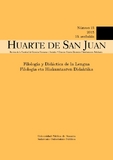The influence of socio-economic background, personal effort and motivation on English proficiency
Keywords:
Socio-economic background, personal effort, language input, motivation, english proficiencyAbstract
The aim of this study was to investigate the influence of three factors –socio-economic background, individual effort, and motivation– in English proficiency, and the possible relation between individual effort and family background, and between motivation and family background. The instrument used to collect the data was a questionnaire completed by 159 students from three high schools in Spain. The answers to the questionnaire were correlated with those students’ grades in the subject English using SPSS. Results indicated that, from the three factos analyzed, motivation influenced students’ proficiency the most and that motivation correlated with mother’s occupation and higher amounts of input outside classes. From these findings, it can be concluded that English proficiency can be improved by increasing motivation, which in turn, can be increased by teachers providing more input and more enjoyable ways of getting input outside class such as listening to music or watching films in English.
Downloads
References
Barrios-Espinosa, E. (2015): «La incidencia del sexo, del nivel de competencia en inglés y del grado de motivación en percepciones sobre aprendizaje a través de una aplicación en línea» Educación XX1, 18(1), pp. 283-302. DOI: <http://dx.doi.org/10.5944/educxx1.18.1.12333>.
Bernardi, F.; Requena, M. (2010): «Inequality in educational transitions: the case of post-compulsory education in Spain», Revista de Educación, número extraordinario, pp. 93-118. <http://www.revistaeducacion.mec.es/re2010_04.htm>.
Bernaus, M.; Wilson A.; Gardner, R. C. (2009): «Teachers’ motivation, classroom strategy use, students’ motivation and second language achievement», Porta Linguarum, 12, pp. 25-36. <http://www.ugr.es/~portalin/articulos/PL_numero12/2%20Merce%20Bernaus.pdf>.
Cullinan, B. E. (2000): «Independent Reading and School Achievement», School Library Media Research, 3. <http://www.ala.org/aasl/sites/ala.org.aasl/files/content/aaslpubsandjournals/slr/vol3/SLMR_IndependentReading_V3.pdf>.
Dörniey, Z. (1998): «Motivation in second and foreign language learning», Language Teaching, 31, pp. 117-135. DOI: 10.1017/S026144480001315X
Feito, R. (2003): «Sistema de enseñanza y estratificación social», en Fernández Palomares, F. (ed.), Sociología de la Educación, Madrid, Pearson, pp. 143-165.
Fernández Enguita, M.; Mena Martínez, L.; Riviere Gómez, J. (2010): Fracaso y abandono escolar en España, Barcelona, Fundación La Caixa – Colección Estudios Sociales.
Gardner, R. C. (1985): The Attitude/Motivation Test Battery: Technical Report, London, ON, University of Western Ontario.
Gardner, R. C. (2007): «Motivation and Second Language Adquisition», Porta Linguarum 8, pp. 9-20. <http://www.ugr.es/~portalin/articulos/PL_numero8/1-R%20C%20%20GADNER.pdf>.
Genc Ilter, B. (2009): «Effect of Techonology on Motivation in EFL Classroom», Turkish Online Journal of Distance Education, 10 (4), pp. 136-158. .
Gil Flores, J. (2011): «Measurement of the socio economic status in Primary Education students», Revista de Educación, 362, pp. 1-17. DOI: 10.4438/1988-592XRE-2011-362-162.
Gradman, H. L.; Hanania, E. (1991): «Language learning background factors and ESL proficiency», The Modern Language Journal, 75, pp. 39-51.
Hewitt, E. C. (2007): «La percepción del factor de los padres en el aprendizaje del inglés en la escuela primaria: un estudio empírico» Porta Linguarum, 7, pp. 75- 87. <http://www.ugr.es/~portalin/articulos/PL_numero7/6Elena.pdf>.
Kelsen, B. (2009): «Teaching EFL to the iGeneration: A Survey of using YouTube as supplementary material with college EFL students in Taiwan» CALL-EJ Online, 10 (2): <http://callej.org/journal/10-2/kelsen.html>.
King, J. (2002): «Using DVD Feature Films in the EFL Classroom», Computer Assisted Language Learning, 15, pp. 509-523. DOI: 10.1076/call.15.5.509.13468
Kuehn, Z.; Landeras, P. (2012): The effect of family background on student effort, Serie Capital Humano y Empleo, Santander, Catedra Fedea.
Madrid, D.; Ortega, J. L.; Jiménez, S.; Pérez, Mª C.; Hidalgo, E.; Fernández, J.; Perez, M. B.; García, M. M.; Gomis, A.; Verdejo, M. M.; Robinson, B. (1993): «Sources of Motivation in EFL Classroom», VIII Jornadas Pedagógicas para la Enseñanza del Inglés, Granada, 1, 2 y 3 octubre, 1992, pp. 18-36.
Martínez García, J. S. (2007): «Clase social, género y desigualdad de oportunidades educativas», Revista de Educación, 342, pp. 287-306. <http://www.revistaeducacion.mec.es/re342/re342_14.pdf>.
Requena, M.; Salazar, L.; Radl, J. (2012): Estratificación social, Madrid, McGrawHill.
Rodríguez Izquierdo, R. (2012): «Éxito académico de los estudiantes inmigrantes: factores de riesgo y de protección», Educación XX1, 13(1), pp. 101-123. DOI: <http://dx.doi.org/10.5944/educxx1.13.1.279>.
Sanchez, E. G. (2013): «Factores motivacionales extrínsecos e intrísecos en el aula de inglés: análisis empírico», Porta Linguarum, 19, pp. 275-297. <http://www.ugr.es/~portalin/articulos/PL_numero19/17%20Elena%20G%20Sanchez.pdf>.
Taberner Guasp, J. (2003): Sociología y educación, Madrid, Tecnos.
Trinidad Requena, A.; Gómez González, J. (2012): Sociedad, Familia, Educación: una introducción a la sociología de la educación, Madrid, Tecnos.
Weiser, D. A.; Riggion, H. R. (2010): «Family background and academic achievement: does self-efficacy mediate outcomes?», Social Psyschology of Education, 13, pp. 367-383. DOI: <http://dx.doi.org/10.1007/s11218-010-9115-1>.
Downloads
Published
How to Cite
Issue
Section
License
All articles are published under a Creative Commons (BY-NC-ND 4.0) license. Each article will be assigned a DOI.
Authors retain copyright of their work and grant the journal the right to the first publication. Authors can sign additional agreements to non-exclusive distribution of the published version of the article (for example, in an institutional repository) as long as appropriate attribution to the original publication is provided. Articles can be uploaded to institutional repositories immediately after publication.
Electronic distribution of the articles (for example, academic social networks or personal webpages) is allowed and encouraged.
The journal reserves the right to publicise the work in social networks and other electronic means.







